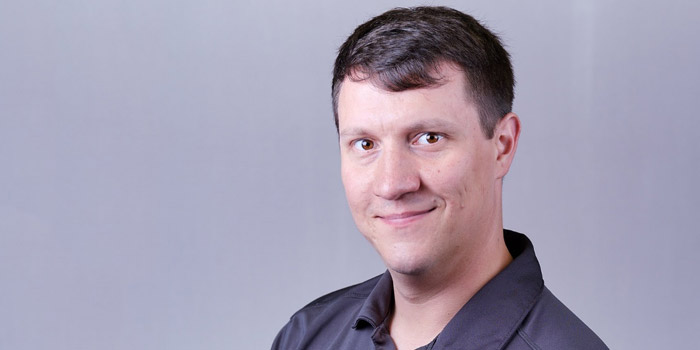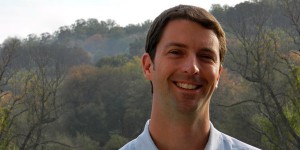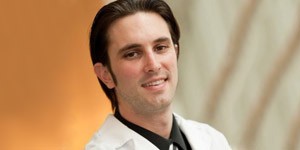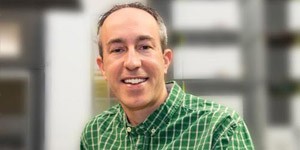Meet the Experts is a series of interviews conducted by experts from the field of Cannabis to world leaders in research and clinical practice of Cannabis as medicine.
Ezra Pryor studied geology and chemistry at the University of Maine, in the small town of Farmington. His grandmother, Prof. Phyllis Brown, was a female pioneer in the field of chromatography who received the EAS Award for Outstanding Achievements in Separation Science in 2006.

Pryor took graduated studies in analytical chemistry at the University of Rhode Island, Kingston, and worked as a lab manager at the University of Southern California, in Los Angeles, before starting his own consulting company, EZ CHEM. Ezra has been serving the cannabis industry for over 5 years, assisting cannabis extractors in California to increase the safety and quality of their operations, before founding the Cannabis Chemistry Subdivision (CANN) within the American Chemical Society (ACS), for which he now serves as Past-Chair. He currently works as Applied Markets Specialist for Heidolph North America.
Fundación CANNA: Thank you, Ezra, for taking the time to participate in this series of interviews with cannabis experts for Fundación CANNA Let's start with how did you first got involved in the cannabis industry? Did it just happen by chance or you had an early vocation?
Ezra Pryor: I studied chemistry because it seemed to be something I was good at. I have always been good at visualizations, perhaps because my parents were both visual artists and we often talked about our observations. Also, my grandmother had great success in the field so I got to see what it could look like to do well as a chemist. She was a great inspiration for me so it made me really happy that she was able to sign our petition for division formation before passing.
Originally, I worked as a lab manager at the University of Southern California (USC). Back then I could not have imagined that cannabis would have provided so many opportunities for chemists. Around 2011, after a few years at USC, it occurred to me that there was a growing demand for chemical analysis of cannabis products. I considered starting an analytical lab but, in the end, decided it was too risky at that point. Later, while I was studying chemistry in graduate school, the opportunities only grew and in those two years I was studying there was a vast expansion of analytical laboratories in the United States, from just a few to more than two dozen.
FC: What aspect of cannabis chemistry enticed you more? Analytical, organic, biochemistry, medicinal...
EP: By the time I left graduate school it was clear that I should pursue a career in cannabis chemistry. My resolve was further strengthened by the fact that there was a tremendous need for chemists in the cannabis space outside of analytical laboratories. That's when I decided I should start my own consulting company. I called it EZ Chem Consultancy Incorporated. I ran that from 2013 to Q1 of 2016. I was always most interested in analytical chemistry because that was what I was trained in. I learned very quickly though, that most of the help people needed in the extraction field was more along the lines of organic and process chemistry, so that is how I started to spend most of my time.
FC: Which of your scientific accomplishment makes you feel more satisfied?
EP: Without a doubt I am most proud of founding the cannabis chemistry subdivision (CANN) at the American Chemical Society (ACS). It's also very important to acknowledge that even though I was the one to come up with the idea, I am not the only founding member. Dr. Joseph Payack, Melissa Wilcox, Dr. Jahan Marcu, and Dr. Mark Scialdone were each essential in the early days of getting CANN accepted as a subdivision. I consider them all founding members and these days it's hard to count the volunteers, because so many people have helped us to get to where we are today. Most recently we have broken the 200 dues paying members mark, which brings us nearly halfway to our target membership before applying for full division status.
Since I started my job at Heidolph, we have also been able to secure a substantial donation to establish the first ever cannabis chemistry scholarship. The tremendous generosity of Jim Dawson, president of Heidolph, has allowed us to sponsor speakers at the ACS national meetings. This means more people will be able to come and present their research on cannabis to the larger chemistry community. It also extends our reach to build our network to people who are too far afield to otherwise join us.
FC: You had your consulting company and now work for an international manufacturer. How do you see the cannabis industry in 5 years.
EP: I have had the pleasure of working in the cannabis industry for the last five years and interacting with many great companies and individuals. I believe that the trend I have seen so far will continue in that companies are becoming larger as the perceived risk becomes smaller.
People tend to say that one day cannabis will be completely run by large corporations. I do see it going that way, but I don't believe it will be an overnight change as people seem to think. Instead, I believe there will be step-wise changes where we see more companies with facilities in multiple states and more companies with multi-million dollar budgets with each passing year. The other change I see coming mirrors again changes that I've seen happen slowly over the last five years, which is an increase in quality control. I look forward to the day where cannabis is held up to the same quality control standards as any other food or medicine that people receive commercially. We are certainly not there yet but we are much closer that we were years ago.
FC: Tell us about CANN. How did you decided to lead this initiative and what is the future for CANN?
EP: I decided to start CANN because I realized that the chemists in the cannabis industry were completely unconnected. In 2014 I had already been an ACS member for six years. I knew that they had many technical divisions that represented subsets of chemistry. I saw this as the most potent opportunity to connect with scientists in the field. The future of CANN is ACS division status. This would allow us to make our own rules, receive an allotment from the ACS, do things like start our own scholarly journal centered around cannabis chemistry.
FC: What are the benefits of joining CANN for researchers, students and professionals outside the US?
EP: Benefits of membership for anyone in any country include expanding your professional network, exposure opportunities, support from a wide group of colleagues, mentorship and job opportunities, just to name a few. It's important to realize that the American Chemical Society despite its name is an international organization and anyone can join regardless of their location or nationality. Anyone in a country besides the United States can use this group to network with other cannabis chemists in their country and we can work together to bring their discoveries to the larger chemistry community and to the public as well. Benefits for sponsors include exposure to a concentrated group of cannabis scientists, insight in the direction that cannabis chemistry is moving, and opportunities to benefit advancements of cannabis chemists. Because we are a 501(c)(3), all donations are fully tax-deductible, and they can also accomplish some of your marketing goals.
FC: Can you tell us about the Heidolph Scholarship for students to attend the ACS expo?
EP: Anyone interested in applying to the Heidolph Scholarship (CANNCHASHNA) should submit an abstract and title of the proposed talk and a resume to the following address CANNCHASHNAAward@gmail.com, by July 1st. The only requirement for applicants is that they must be willing and able to give a scientific presentation on their cannabis research at the following spring American Chemical Society meeting. I am proud to announce that we have a spectacular lineup of cannabis programming this coming ACS National Meeting in March held in New Orleans Louisiana. This year we have content programmed on nearly every part of each day of the conference. Additionally, we will be presenting our first cohort of CANNCHASHNA Award winners with plaques, metals, and a check at the scholarship symposium.
FC: Your grandmother was a female chemists born in the 20's, which was quite unusual at the time. How do you see the role of female scientists in the present and future of the cannabis industry?
EP: At CANN we strive to include women in leadership roles and speaking positions. There is a tendency that we must fight against which leads to few women in executive positions and as speakers in our symposium. I believe that by openly discussing this and making a commitment to close the gender gap we can, at least to some degree, reverse this phenomenon. This spring, for example, we have a symposium which is staffed entirely by women in an effort to push our gender ratio more towards the middle.
FC: How do you feel about the recreational versus the medicinal market? There is many information around that seems more designed for marketing purposes than based in scientific evidence.
EP: Certainly, the medical and recreational markets have, to some extent, dissimilar needs. I think expansion of medical markets will lead to more diverse products as we learn more about the so-called minor cannabinoids and their effects on the human body, while expansion of recreational markets will lead to lower prices for high-THC cannabis. It's hard to tell where this interplay will lead us.
FC: Extracts are very popular in the adult market in the US, not so much in Europe, although is a raising trend. What method of extraction do you think will prevail?
EP: This is a very difficult question to answer. At this point it seems to be a competition between carbon dioxide and butane/propane extractions. We do see extractions with ethanol and other liquid at room temperature solvents, but they tend to be for products that are left "crude" so to speak. I believe that mixed hydrocarbons certainly have their place. The safety of the use of explosive solvents has changed dramatically in the past few years as extraction technology has developed significantly in our industry. That was my largest concern in the past. I do think that as time moves on we will see greater and greater advances in mixed hydrocarbon such that the safety risks are negligible. On the other hand, a solvent like compressed CO2, which is less selective but is easier to work with from a process standpoint, is also being further developed. The milestone here is when easy and complete separation of components is achievable at a reasonable cost. I used to think that CO2 would win out just because the laws would develop in such a way to eliminate the possibility of mixed hydrocarbon extraction, but it doesn't seem to be the way things are going. It is reasonable to assume that, in the end, one of these two methods will prevail as most popular and fuel further development. But at this point is very hard to tell where it will go.
FC: Thank you so much, Ezra, for taking the time to talk to us. Is there anything else you would like to add?
EP: If I may, I would like to make a call for volunteer for CANN. We are entirely run by volunteers and we simply would not exist without the help of people not unlike yourself, with altruism and a long view. It's a fantastic opportunity to build your skills and your resume. You can try your best at something you have no experience with and, when you succeed, you will have a wide number of people happy to recommend you for your new skill. It has been the path to tremendous personal growth for me and to some of the best friends I have ever had. The best way to get in touch with us is to reach out to me at ezra.pryor@gmail.com or our current Chair, Andrew Pham at phamcongandrew@gmail.com.
Those not interested in volunteering but who would like to show us support can sign our petition for division formation at https://www.gopetition.com/petitions/petition-for-a-new-acs-professional-division-cannabis-chemists.html or Tinyurl.com/naonap7


